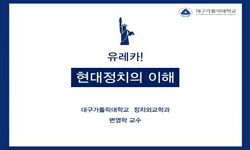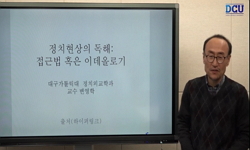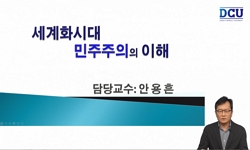This research paper intended to identify the causal relationship between elections and incumbent governments' fiscal policy. The first hypothesis of this paper was deduced from the review of the debates on the relevance of the Political Business Cycle...
http://chineseinput.net/에서 pinyin(병음)방식으로 중국어를 변환할 수 있습니다.
변환된 중국어를 복사하여 사용하시면 됩니다.
- 中文 을 입력하시려면 zhongwen을 입력하시고 space를누르시면됩니다.
- 北京 을 입력하시려면 beijing을 입력하시고 space를 누르시면 됩니다.
https://www.riss.kr/link?id=A76296110
- 저자
- 발행기관
- 학술지명
- 권호사항
-
발행연도
2007
-
작성언어
Korean
- 주제어
-
등재정보
KCI등재
-
자료형태
학술저널
- 발행기관 URL
-
수록면
149-182(34쪽)
- 제공처
-
0
상세조회 -
0
다운로드
부가정보
다국어 초록 (Multilingual Abstract)
This research paper intended to identify the causal relationship between elections and incumbent governments' fiscal policy. The first hypothesis of this paper was deduced from the review of the debates on the relevance of the Political Business Cycle (PBC) model which shed light on the causal effect of elections on the economy. From this review, I discovered such necessary conditions as "the fixed timing of elections," "incumbent governments' majority status in the legislature" and "manageable economic condition," and then formulated the first hypothesis on the basis of these three conditions. This paper derived the second groups of hypotheses from the relaxation of an assumption of the PBC model with regard to the extent of electoral influence on incumbent governments' policy incentive to manipulate fiscal policy. The relaxation of the assumption drove me to focus on such new variables as "regime types" and "the proximity to election dates" which constituted the independent variables of the second and third hypothesis, respectively.
This paper constructed basic three statistical models to test three hypothesis and then conducted the autoregressive integrated moving average (ARIMA) time-series regression analysis. The ARIMA regression analysis of the first statistical model revealed that Korean incumbent governments have pursued expansionary fiscal policy one quarter before elections, while Taiwan governments have done so three quarters before elections.
The analysis of the second and third model disclosed that Korean and Taiwan incumbent governments' fiscal manipulation varied with the extent of electoral influence. However, the way that they were affected by the extent of electoral influence was different. While the probability and extent of Korean governments' fiscal manipulation changed according to the types of regime, Taiwan governments' pre-electoral fiscal policy were not subjected to the variable of regime types but rather to that of the proximity to election dates.
The research paper run the F tests to identify which one has more explanatory power between two groups of regression models. The F tests told us that the second groups of the regression models underpinning hypotheses derived from the relaxation of the assumption on electoral influence were better than the first model which was based on the assumption that the effect of elections on incumbent governments' economic policy would be the same in every election.
목차 (Table of Contents)
- Ⅰ. 서론
- Ⅱ. 가설의 구성
- Ⅲ. 가설검증의 방법론적인 문제 : 변수측정, 사례선택, 회귀모델
- Ⅳ. 회귀분석 결과 및 해석
- Ⅴ. 결론
- Ⅰ. 서론
- Ⅱ. 가설의 구성
- Ⅲ. 가설검증의 방법론적인 문제 : 변수측정, 사례선택, 회귀모델
- Ⅳ. 회귀분석 결과 및 해석
- Ⅴ. 결론
- 참고문헌
- abstract
동일학술지(권/호) 다른 논문
-
- 고려대학교 아세아문제연구소
- 정준호(Jeong Jun Ho)
- 2007
- KCI등재
-
- 고려대학교 아세아문제연구소
- 유철규(Yoo Chul G)
- 2007
- KCI등재
-
- 고려대학교 아세아문제연구소
- 박종현(Park Jong Hyun)
- 2007
- KCI등재
-
- 고려대학교 아세아문제연구소
- 조형제(Jo Hyung Je)
- 2007
- KCI등재





 KCI
KCI DBpia
DBpia






